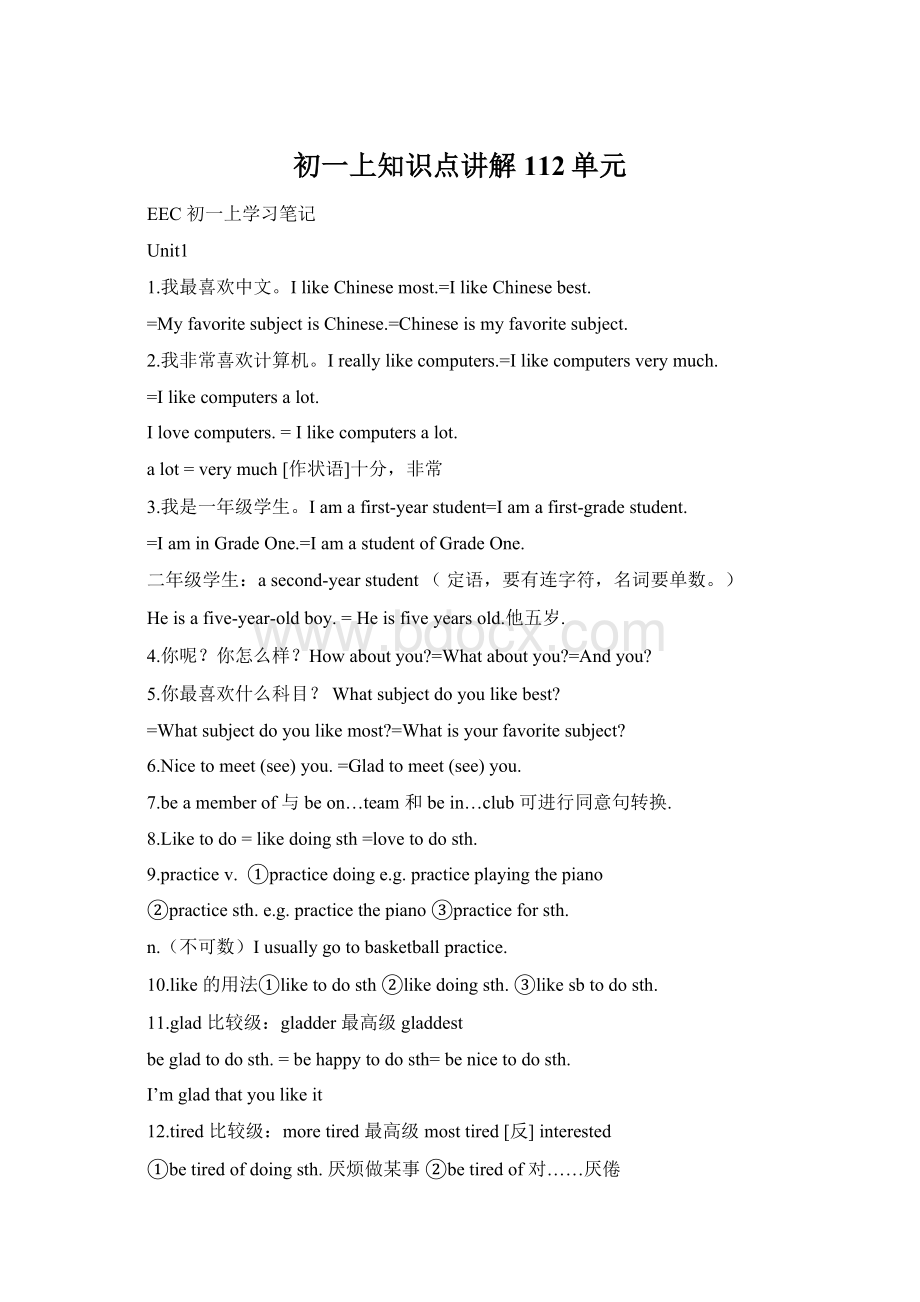初一上知识点讲解112单元Word文件下载.docx
《初一上知识点讲解112单元Word文件下载.docx》由会员分享,可在线阅读,更多相关《初一上知识点讲解112单元Word文件下载.docx(45页珍藏版)》请在冰豆网上搜索。

n.(不可数)Iusuallygotobasketballpractice.
10.like的用法①liketodosth②likedoingsth.③likesbtodosth.
11.glad比较级:
gladder最高级gladdest
begladtodosth.=behappytodosth=benicetodosth.
I’mgladthatyoulikeit
12.tired比较级:
moretired最高级mosttired[反]interested
①betiredofdoingsth.厌烦做某事②betiredof对……厌倦
13.funn.乐趣adj.funnyhavealotoffun有很多乐趣。
havealotoffundoingsth.做某事有很多乐趣(很快乐)=It’sfuntodosth.
Havefun!
玩的快乐!
Thisgameisalotoffun!
这个游戏太好玩了!
14.sciencen.科学scientist科学家
Unit2
1.afterschool=afterschoolisover=after+主语+finishschool.
2..take/havepianolessons
3.everySaturday=onSaturdays(对“每六周”提问,用Howoften…?
4.Ionlyeatwithafork.=Ionlyuseaforktoeat.
5.begoodat 擅长做某事bebadat=bepoorat不善长,拙于
dowellinsth
doingsth.
6.bebetterat=dobetterin更擅长…
7.Ionlyusemyrighthandintabletennis.=Ionlyplaytabletenniswithmyrighthand.
8.playsports做运动=dosports=takeexercise=getexercise
9.hear/listen
Listento听的动作
Hear听的结果,一般与can连用
10.readyadj.[作表语]有准备的,准备好的
bereadyforsth.准备好干什么;
做好准备去做某事;
为……做准备
=bereadytodosth.
=getreadyforsth.
=getreadytodosth
=preparefor为……做准备(for的宾语一般只是谓语动作要达到的目的。
=bepreparedfor=bepreparedtodosth.
11.afterprep.
sth.sth.
afterdoingbeforedoing
从句从句
IgotoschoolafterIhavebreakfast.=Igotoschoolafterhavingbreakfast.
12.every
every三者或三者以上,不加of必加名词
each二者以上加of可加名词,也可单独用
each和every
◆each一定数目中的“每一个”;
“个别”意义较重,表示“各有不同”,更强调个人或个别:
Eachonehashisweakness.每人都有每人的缺点。
◆every数目不确定的许多人或物中间的“每一个”;
“总合”意义较重,表示“大家一致”:
Everyoneishere.大家都到了。
◆each和every后的动词必须是单数
each可作主语、同位语、定语和状语,
every只能作定语
13.形容词比较级变型:
1.+er/est
2.辅音字母+y,变y为i,+er/est
3.双写最后一个辅音字母,+er/est
4.多音节词前+more/most
不规则形容词(或副词)比较级及最高级
good/wellbetter-bestbad/ill/badlyworse-worst
littleless-leastmuch/manymore-most
oldolder-oldestelder-eldest
farfarther-farthest
further-furthest
①在形容词、副词的比较级前可用much,alittle,even,far,any,abit,still,no…来修饰,以强调程度加强语气
②倍数+比较级+thane.g.Iamoneyearyoungerthanyouare.
③比较级+and+比较级:
越来越……
Theboyisgrowingtallerandtaller.这男孩长得越来越高。
④the+比较级…the+比较级
Themore,thebetter.越多越好。
Themoreyouread,themoreyou’llget.你读得越多,就收获越大。
Themoredifficulttheproblemis,themoreinterestedhebecomes.题越难他越感兴趣。
Themoreheeats,thefatterhegets.他吃得越多,就越发胖。
SheisbetterthanIamwithcomputer.=SheisbetterthanIamatcomputers.
=SheisbetteratcomputersthanIam.=ShedoesbetterthanIdoincomputers.
=ShedoesbetterthanIdoatusingcomputers.
14.helpsbtodosth.=helpsbdosth.=helpsb.with+n.
15.studyhard=workhard学习努力
Wearealldifferent=Wearenotallthesame.我们都是不同的.
Whatareyoulike?
=Whatdoyoulooklike?
16..belike=looklike
4.I’mhungry=I’mnotfull.=Iwanttoeat.
17.I’malittleshy?
(对划线部分提问)Whatareyoulike?
18.playwithsb/sth.
with+人,表示“和……一起玩”
with+物,表示“玩弄东西”
19.
or
用于肯定句、疑问句:
或者Whichdoyoulikebetter,applesororanges?
用于否定句:
既不……也不……Hedoesn’tsmoke(抽烟)ordrink.
用于命令句:
否则……Getuporyou’llbelateforschool
Unit3.
单词语法
1.easyadj.adv.easily
It’seasyforsb.todosth.
beeasytodoe.g.Thislessoniseasytolearn.这课书容易学。
Takeiteasy.别着急
2.either
1).(放在否定句尾)也
2).两者中的任何一个
Eitherof….谓语动词用单数。
Either…or…或者……或者……(动词就近原则)
e.g.EitheryouorIamright.EitherIoryouareright.
too肯定句、疑问句末,前有逗号。
either否定句末,前有逗号。
also句中,实义动词前,be动词后。
aswell肯定句,不加逗号
eitherAorB“非A即B”EithersheorIamright.
neitherAnorB“非A亦非B”NeithershenorIamright.
bothAandB“AB两者都”BothsheandIareright.
3.interestingadj.引起兴趣的,有趣的adj.interested感兴趣的n./v.interest
n.兴趣,爱好;
v.
使感兴趣;
使着迷使某人对……发生兴趣(in)
Heinterestedmeinfootball.他使我对足球产生了兴趣。
beinterestingtosb.对某人来说很有趣
it’sinterestingtodosth.做某事很有趣
interesting修饰物
interested修饰人beinterestedinsth.对……感兴趣
Weareveryinterestedintheinterestingstory.我们对那个有趣的故事很感兴趣。
4.liftvt.举起,抬起,提起Thisboxistooheavyformetolift.
vi.(云、雾等)消散n.(升降式)电梯(escalator扶梯式电梯)
课文语法:
1.I’mamemberofthevolleyballclub.=I’minthevolleyballclub.
2.like
todosth.
doingsth.
sth.
sb.todosth
3.ChineseandEnglishareverydifferent.bedifferentfrom=benotthesameas…
4.studyforsth./sb.为……而学习studyhard=workhard
5.kindadj.(反义词)unkind不友好adv.kindlyn.kindness
bekindtosb.=begoodtosh.=befriendlyto对……很友好(和善)
beunkindtosb.对……不友好
It’skindofsb.todosth.=sb.iskindtodosth.某人做某事是很友好的
“be+形容词”后用ofsb.的形容词有:
kind,good,nice,clever
n.种类akindof某种,几分
this/thatkindofdifferentkindsofallkindsof…各种各样的
those/thesekindsof…多种多样的
Thechildrenarekindtotheoldman.Theydoallkindsofthingsforhim.
孩子们对这位老人很友好,他们为他做各种事情。
6.Ilikethepianomore.=Ireallylikethepiano=Ilikethepianobetter.
7.Ican’tplayeitherofthem.=Icanplayneitherofthem.
eitherof…两者中任何一个,单三
8.Ionlyusethecomputer.
useadj.useful,useless没用的adv.usefully
usesth.todosth.=usesth.fordoingsth.
9.everyday句尾,时间状语,副词或名词
everydayadj.日常的+名词
e.g.everydayEnglish日常英语
unit4
1.
+形容词:
I’mfeelingalittlehungry.我觉得有点饿了。
He’salittlesorryforthat.他因为那事有点后悔。
+形容词比较级:
Heisalittlebettertoday.他今天(的情况)略有好转。
+不可数名词:
Thereisalittlemilkintheglass.杯里只有一点牛奶。
+名词单数*:
(一个小的/可爱的)alittlesheep
+副词:
Youarewalkingalittlefast.他走得快了点。
+动词:
Ilikeheralittle.我有点喜欢她。
*little小的,小巧的(带有感情色彩,表示喜欢、可怜或讨厌);
常与形容词nice,pretty,poor或silly搭配使用:
anicelittledog一只可爱的小狗
2.gohome
walkhome
cometomyhome.加to,因为home在这里是名词。
3.todosth.
dosth.
withsth.
helpsb.withsth.=helpsb.(to)dosth.帮助某人(做)某事
withthehelpof在……的帮助下
Helpyourself(tothefruit).请随便取(水果)吧。
4.No.8MiddleSchool专有名词大写amiddleschoolstudent
5.milk不可数名词,跟水有关的名词都是不可数名词。
6.inthemorning/afternoon泛指时,用in.特定某日中的一段时间,用on.
onthemorningoflastSunday上星期天早晨
7.doone’shomework
8.use-usefulusesth.todosth.
9.Mysisterisdifferentfromme.
10.onweekdays=fromMondaytoFriday从星期一到星期五
unit5
1.sometimes=attimes对其提问用Howoften
2.homeworkun.doone’shomework
3.eveningintheevening泛指
Goodevening晚上见面时说
Goodnight.晚安。
(睡觉前说)
4.usuallyadv.(=asarule,指经常的行为。
)adj.usual
asusual象往常一样,照例,照常(指与以往的行为作比较的某一次的行为)
Asusual,hearrivedlast.照例,他最后一个到。
5.alwaysadv.([反义词]never)
1.单独使用,与一般现在时连用
2.always=allthetime
3.bealwaysdoingsth.总是做某事
和动词一般现在时连用:
永远,始终,总是
Thesunalwaysrisesintheeast.太阳总是从东方升起。
和动词完成时连用:
一直
Youhavealwaysbeenmyclosestfriend.你一向是我最亲密的朋友。
和动词进行时连用:
总是,老是
Heisalwaysaskingmeformoney.他老向我要钱。
I’malwaysforgettingpeople’snames.我老是记不住别人的名字。
6.breakfast
have/takebreakfast=eatbreakfast吃早餐have/eat…forbreakfast吃……当早餐
atbreakfast在早餐时
7.never=not…atanytime不在任何时候
I’mneverlateforschool.=I’mnotlateforschool.
=I’mnotlateforschoolatanytime.=Idon’tgotoschoollate.
否定:
never换成always/oftenIalwaysgotoschoollate.
8.dress
dress的句型
1.dress+sb.(或oneself)Shedressesthebaby.她给孩子穿衣服。
2.dress后不能接“衣服”类的词作宾语
3.be(或get)dressedin+衣服或表示颜色的词
4.dressoneself=getdressed“自己穿衣服”/+in+颜色+衣服(穿上…衣服)
Canyoursondresshimself?
=Canyoursongetdressed?
9.dressup强调打扮,意为“穿上盛装、乔装打扮”+in+adj.+衣服
如果表示穿鞋、补袜、戴帽、手套时,可根据情况用wear,haveon,puton
puton
动作
+鞋、帽、衣服、眼镜等
一般用祈使句
dress
+人,不能是衣服
bedressedin
+衣服/+颜色(表状态)
bein
可
互
换
状
态
+衣服、帽;
+颜色
haveon
+衣服、帽
没有进行时;
宾语是代词时,只能放在on前;
是名词时,可以放在on前,也可以放在on后
wear
+鞋、帽、衣服、首饰、眼镜、发型
可用进行时;
iswearing/wears
10.hurryhurries,hurrying,hurried,hurried
n.hurry仓促;
慌忙inahurry匆忙地
hurryup赶紧,赶快
beinahurrytodosth.匆忙做某事 =hurrytodosth.
beinahurrytocatchthetrain匆忙地赶火车
hurryoff=hurryaway匆忙离去
11.begin同startbegins,beginning,began,begunn.beginning
begintodosth.=begindoingsth.
frombeginningtoend从头至尾,自始自终
atthebeginningof…在……初期atthebeginningofthemonth(在)月初
(attheendof…在……末期)inthebeginning起初,开始
12.asleepadj.睡着的adj.sleepy困倦的n./v.sleepfallasleep=beasleep
beasleep睡着(的状态)
besleeping正在睡觉
fallasleep入睡表示“入睡”这一状态,可借助于fast,sound等形容词修饰
gotosleep去睡,就寝强调动作的结果[反]wakeup
gotobed去睡,就寝指去睡的动作 [反]getup
beinbed(躺)在床上;
不一定睡觉了,指上床躺下后的状态
beillinbed指生病躺在床上
13.forget[反义]remember用法一样forgets,forgetting,forgot,forgotten
forgetsth.=forgettotakesth.(忘带某物)
forgettodosth.(忘记了要去做某事)此事还没做
forgetdoingsth.(忘记已经做过某事)此事已经做过了
1.Iforgethisname.我忘了他的名字。
2.Iforgetmykey.=Iforgettotakemykey. 我忘带钥匙了。
3.Don’tforgettodoyourlessons. 别忘了做功课。
4.Iforgotfinishingdoingmyhomework.我忘记已经做完作业了。
don’tforgettodosth.不要忘记做某事
forget+sth.不加地点状